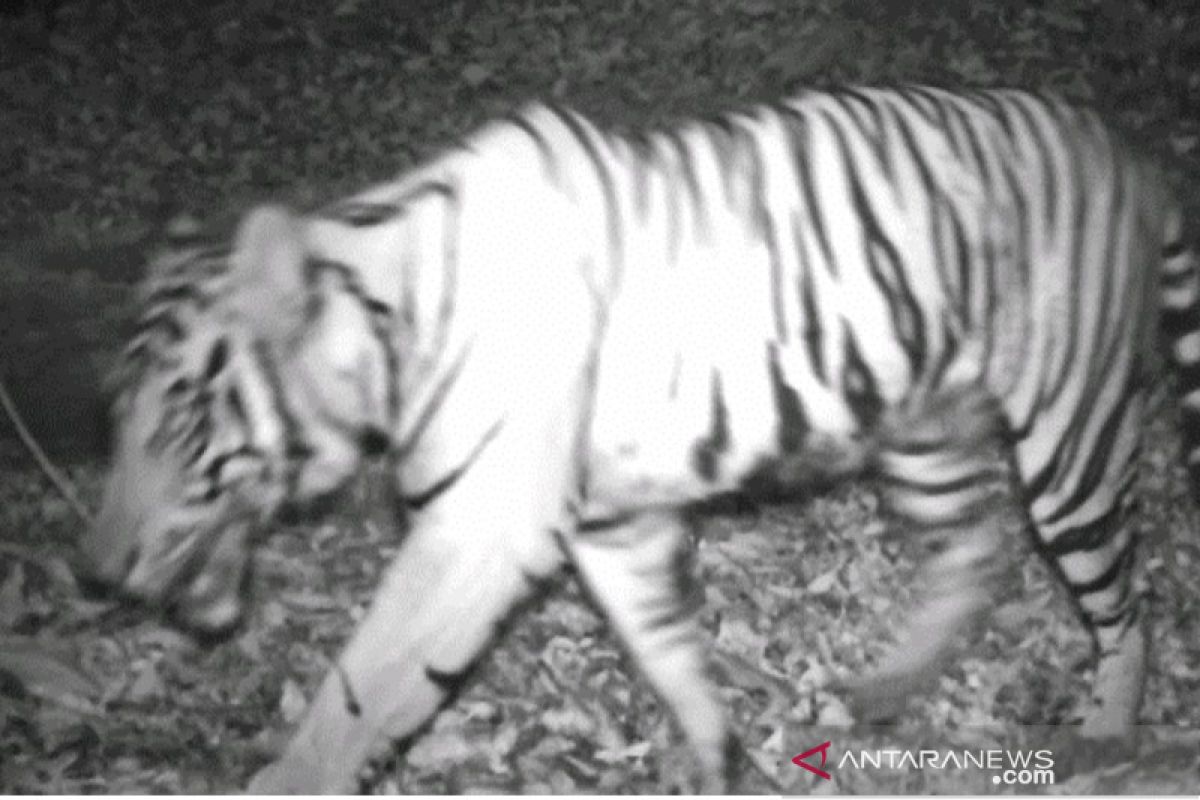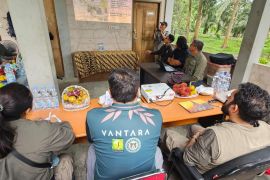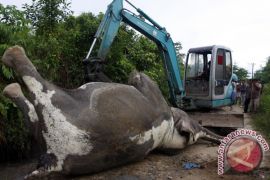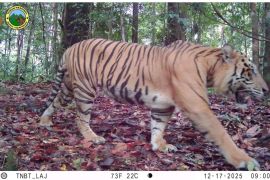These human-wildlife conflicts must immediately be resolved to prevent both people and wild animals from getting dragged into an ongoing sufferingBogor, W Java (ANTARA) - Human-wildlife conflicts and illegal wildlife trade still pose threats to Indonesia's endeavors to save its endangered species from extinction. Over the past two years, the human-elephant conflict, for instance, has become a major conservation concern in Aceh and many other elephant range provinces in Sumatra Island.
In February 2019, at least 14 herds of wild Sumatran elephants (Elephas maximus sumatranus) had wandered in search of food in the areas of districts such as Tamiang, Pidie, Central Aceh, Bener Meriah, and Biruen.
According to the Head of the Lhokseumawe Natural Resources Conservation Agency (BKSDA), Dedi Irvansyah, around four up to five herds were found wandering around the forest areas of East Aceh and Tamiang Districts.
In North Aceh District, there were three herds of these herbivorous animals, while in the districts of Central Aceh, Bener Meriah, and Bireun, about four herds of wild elephants were also observed, he stated.
Meanwhile, in Pidie Jaya and Pidie Districts, two herds were reportedly observed, he noted, adding that each of the herds consisted of 15 to 20 wild animals.
Three herds of wild Sumatran elephants were also found wandering in search of food in the areas of North Aceh District's Cot Girek, Matangkuli, and Langkahan Subdistricts.
A herd of these jumbo animals also went on a rampage in Negeri Antara Village, Pintu Rimbee Sub-district, Bener Meriah District, by ravaging local farmers' agricultural lands, and attacking a trained elephant named Ida.
As a result, the 40-year-old elephant's legs were wounded.
Then, in October 2019, a human-animal conflict continued in the areas of Bener Meriah District with a herd of wild Sumatran elephants destroying four houses in Pantanlah Village, Pintu Rime Gayo Subdistrict.
The houses belonged to Miswar, Agus, Ahmad, and Sulaiman, all residents of Pantalah Village, according to Head of Pintu Rime Gayo Subdistrict Edi Irwansyah Putra.
While no deaths were reported in the incident, the elephants damaged the agricultural lands of the villagers in search of food.
The human-wildlife conflicts that repeatedly occur in Aceh are not only between local villagers and Sumatran elephants but, in certain areas, also between villagers and tigers.
In dealing with this challenging situation, the South Aceh district government has sent a tiger handler named Teungku Syarwani Sabil (83) to help handle a recent conflict between Sumatran tigers and residents of Durian Kawan Village, Kluet Timur Subdistrict.
"The tiger handler comes from Meulaboh in Aceh Barat District. We sent him to repel the tigers to their natural habitat, and stop posing a threat to the villagers," Head of Kluet Timur Subdistrict Muriadi S was quoted by ANTARA as saying on Sunday.
Teungku Syarwani Sabil was recently deployed to Durian Kawan Village after two cows belonging to the local villagers were attacked by several Sumatran tigers near the village, he said.
He has frequently been deployed by the district government and related authorities to help repel the Sumatran tigers wandering around farmland and villages in Kluet Timur Subdistrict's areas to get back to their habitat.
"The tigers are successfully repelled to forests," he said, adding that the Sumatran tigers' disturbances occur two times in a year during which those endangered wild animals attacked the local villagers' cattle.
In response to the recurrences of human-wildlife conflicts in Aceh, Yahdi Hasan, a member of Aceh Province's legislative body, has appealed to the Aceh provincial administration to seek solutions without making both people and wild animals get suffered.
He argued that the conflicts occur owing to degradation and destruction of the wild animals' natural habitats that are partly contributed by human activities for harvesting natural resources to make a living.
"These human-wildlife conflicts must immediately be resolved to prevent both people and wild animals from getting dragged into an ongoing suffering," Hasan said.
In addition to the ongoing human-wildlife conflicts, the existence of Indonesia's wild animals is also threatened by the practices of illegal wildlife trade.
On September 24, 2020, Lampung police and investigators from the Bukit Barisan Selatan National Park reported that they detained three suspected ivory traders and seized two tusks belonging to Sumatran elephants from them.
The traders, only identified as BT, TW, and AS, are residents of Lampung Province while tusks seized from them measure 59 centimeters and 56 cm in length and weigh 96.2 grams and 94.2 grams, Lampung police spokesperson, Sen.Coms.Zahwani Pandra Arsyad, said.
Police have charged the traders under Articles 21 and 40 of the Indonesian Conservation Law No.5/1990. If found guilty, they face a jail term of five years and a fine of Rp100 million.
The Indonesian government has listed Sumatran elephants among the critically-endangered mammals in the country.
The population of Sumatran elephants is estimated to be about 2,400 - 2,800 individuals, according to figures published on the official website of the World Wildlife Fund (WWF).
The world's leading organization on wildlife conservation and endangered species has pointed out that ivory can still be found in markets around Africa and Asia, and even in the United States and Europe.
WWF has also noted that poaching for illegal ivory trade remains a serious threat to the lives of wild elephants in many countries.
"African elephants declined in massive numbers in the 1970s and 1980s because of poaching for illegal ivory trade. So, international trade was banned by the Convention on International Trade in Endangered Species of Wild Fauna and Flora (CITES) in 1989," the WWF has stated on its website.
It has also said that "some elephant populations have begun to recover, but poaching continues to be a problem in many areas".
A report published by the Journal of African Elephants on July 9 this year stating that ivory trade was rife on social media platforms in Indonesia, Thailand, and Vietnam should be perceived as a warning alarm.
According to the report, Indonesia and Vietnam lack adequate legislation to curb such illegal trade. The inadequare legislation should not hamper Indonesia's law-enforcement efforts to crack down on those involving in the unlawful practices of wildlife trade.
In protecting the country's wildlife from extinction, the government's conservation and mitigation actions as well as strict law enforcement are not enough. The people's active participation in the wildlife conservation efforts is also needed.
Related news: A handler deployed to repel tigers from a village in South Aceh
Related news: Aceh govt urged to seek solutions to human-wildlife conflicts
Editor: Fardah Assegaf
Copyright © ANTARA 2020











